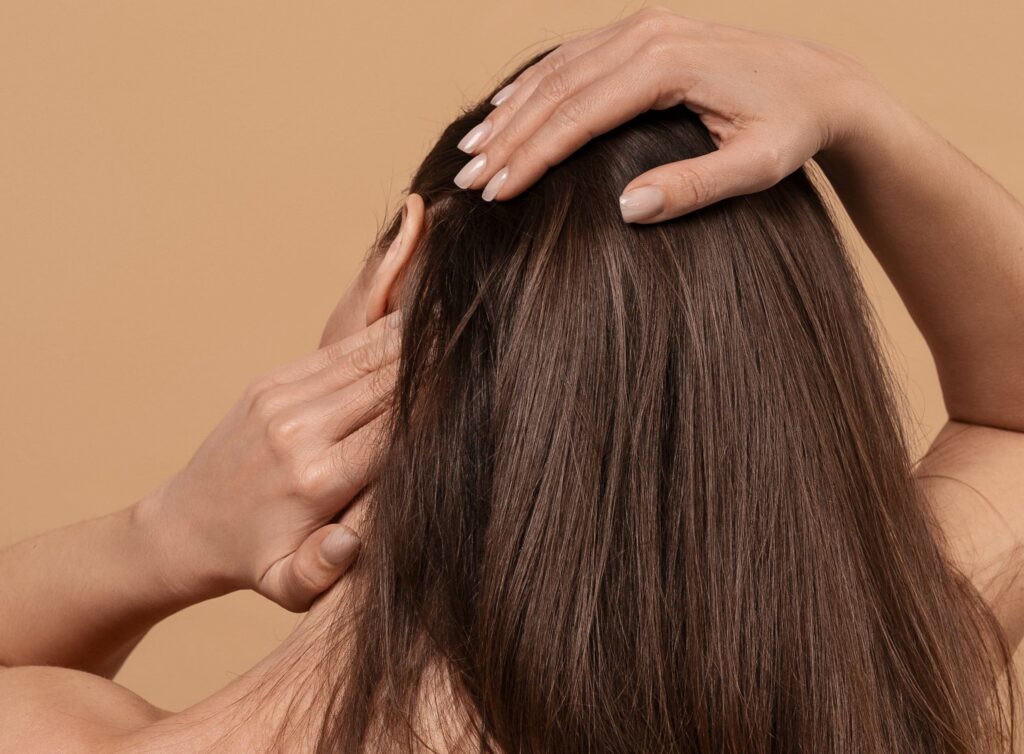

Advertisement
Dealing with the discomfort and embarrassment of scalp psoriasis can be challenging. The itchy, scaly patches that often accompany this condition can affect not just your physical well-being but also your confidence. But you should know that relief is within reach — you have treatment options.
Understanding Scalp Psoriasis
Scalp psoriasis is a chronic skin condition characterized by red, itchy patches covered with silvery scales. On darker skin tones, it may appear as purple patches with gray scales. It occurs when the immune system mistakenly attacks healthy skin cells, causing rapid turnover and the accumulation of skin cells on the scalp’s surface. This leads to the formation of plaques that can be not only uncomfortable but also aesthetically distressing. The exact cause of scalp psoriasis is unknown, but a combination of genetic and environmental factors is believed to play a role.
Treatment for scalp psoriasis focuses on relieving symptoms, reducing inflammation, and slowing down the excessive skin cell growth. While there is no cure, various strategies can effectively manage the condition, providing much-needed relief.
Topical Treatments
One of the primary approaches to managing scalp psoriasis is through topical treatments. Medicated shampoos, creams, and ointments containing ingredients like salicylic acid, coal tar, or corticosteroids can help alleviate symptoms. These products work by reducing inflammation, soothing the skin, and breaking down scales. Regular use, as directed by your healthcare provider, can significantly improve the appearance and feel of your scalp.
It’s essential to follow the prescribed application instructions carefully. Overuse or misuse of these topical treatments can lead to adverse effects, such as skin thinning or increased skin sensitivity. If you experience any unexpected side effects, consult your healthcare professional promptly.
Phototherapy
Phototherapy, or light therapy, is another effective treatment for scalp psoriasis. This involves exposing the affected skin to ultraviolet (UV) light under controlled conditions. UVB light is commonly used for this purpose. Phototherapy helps slow down the rapid growth of skin cells and reduce inflammation.
It’s crucial to undergo phototherapy under the guidance of a healthcare professional, as excessive UV exposure can have adverse effects. Regular sessions may be necessary to maintain results, and your healthcare provider will determine the appropriate frequency and duration based on your specific condition.
Oral Medications
For more severe cases of scalp psoriasis, oral medications may be prescribed. These medications work from within the body to suppress the overactive immune response responsible for the condition. Methotrexate, cyclosporine, and acitretin are examples of oral medications that may be recommended when topical treatments or phototherapy alone are insufficient.
It’s essential to discuss the potential risks and benefits of oral medications with your healthcare provider. Researching your options can help you make an informed choice. Additionally, regular monitoring is typically required to ensure the medication’s effectiveness and to manage any side effects that may arise.
Biologics
Biologics are also an option. They target specific components of the immune system responsible for psoriasis. These drugs, administered through injection or intravenous infusion, work to interrupt the immune response that leads to excessive skin cell growth. Biologics have shown promising results in treating scalp psoriasis, particularly in cases where other treatments have proven ineffective.
It’s important to note that biologics are typically reserved for more severe cases of scalp psoriasis due to their cost and potential side effects. Your healthcare provider will assess your condition and overall health to determine if biologics are a suitable option for you.
Lifestyle Adjustments
In addition to medical treatments, certain lifestyle adjustments can contribute to the overall management of scalp psoriasis. Maintaining a healthy scalp by washing it regularly with a mild, fragrance-free shampoo can help prevent flare-ups. Avoiding harsh styling products and limiting exposure to extreme temperatures can also make a significant difference.
Furthermore, managing stress is crucial, as stress can exacerbate psoriasis symptoms. Incorporating stress-reducing activities such as exercise, meditation, or yoga into your routine can positively impact both your mental well-being and the health of your scalp.
Natural Remedies
Some individuals find relief from scalp psoriasis symptoms through alternative therapies and natural remedies. Aloe vera, tea tree oil, and coconut oil are among the substances believed to have soothing and anti-inflammatory properties. However, it’s crucial to approach alternative therapies with caution and consult with your healthcare provider before incorporating them into your treatment plan.
While these natural remedies may provide relief for some individuals, their effectiveness can vary, and they should not be considered as standalone treatments for moderate to severe scalp psoriasis.
The Key to Long-Term Management
Managing scalp psoriasis is an ongoing process that may require adjustments to your treatment plan over time. Regular follow-ups with your healthcare provider are essential to monitor your condition’s progression and make any necessary modifications to your treatment approach. In some cases, a combination of therapies may be recommended to address different aspects of scalp psoriasis.
Learn More About Scalp Psoriasis Treatments
Understanding how to treat scalp psoriasis is a crucial step towards managing this chronic condition effectively. Finding the right approach for you requires careful consideration and consultation with a healthcare professional. Fortunately, a wealth of information is at your fingertips, offering insights into the latest advancements and personal experiences of those managing scalp psoriasis. Discover the solutions that can bring relief and renewed confidence to your scalp.
Leave a Reply